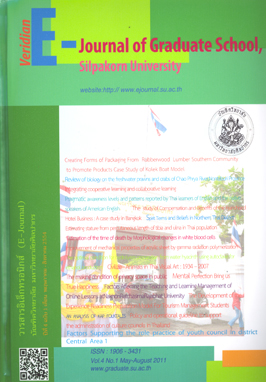นโยบายและแนวทางส่งเสริมการปฏิบัติงานของสภาวัฒนธรรมในประเทศไทย
Main Article Content
Abstract
บทคัดย่อ
การวิจัยครั้งนี้มีวัตถุประสงค์เพื่อศึกษานโยบายและแนวทางส่งเสริมการปฏิบัติงานของสภา วัฒนธรรมในประเทศไทย โดยใช้แบบสำรวจสภาพปัญหาและอุปสรรคในการปฏิบัติงานและเทคนิคเดลฟาย (Delphi technique) ซึ่งเก็บข้อมูลจากสมาชิกสภาวัฒนธรรม ผู้บริหารของกระทรวงวัฒนธรรม และ นักวิชาการ ผลการวิจัยพบว่า
1. สภาพปัญหาและอุปสรรคการปฏิบัติงานของสภาวัฒนธรรมในปัจจุบัน พบปัญหาในเรื่อง งบประมาณ การวางแผนปฏิบัติงานและการติดตามประเมินผล การส่งเสริมและสนับสนุนการจัดกิจกรรมทาง วัฒนธรรม การประชาสัมพันธ์และเผยแพร่ รวมไปถึงการเฝ้าระวังทางวัฒนธรรมและการได้รับความร่วมมือ จากองค์กรอื่น
2. นโยบายเพื่อการปฏิบัติงานของสภาวัฒนธรรมในประเทศไทย ได้แก่ นโยบายการผลักดันให้งาน วัฒนธรรมเป็นวาระแห่งชาติ นโยบายการสนับสนุนให้สภาวัฒนธรรมเป็นองค์กรหลักในการบูรณางานวัฒนธรรม และศูนย์กลางองค์ความรู้ด้านวัฒนธรรม นโยบายส่งเสริมและพัฒนาความร่วมมือจากทุกภาคส่วนในการพัฒนา งานวัฒนธรรม นโยบายสนับสนุนการมีส่วนร่วมในการกำหนดทิศทางการดำเนินงานวัฒนธรรม นโยบายการ ผลักดันให้มีระเบียบและข้อปฏิบัติของสภาวัฒนธรรม นโยบายพัฒนาระบบบริหารงานวัฒนธรรม และนโยบาย ส่งเสริมการประชาสัมพันธ์งานวัฒนธรรม
3. แนวทางการส่งเสริมการปฏิบัติงานของสภาวัฒนธรรม ผลการวิจัยสรุปได้ดังนี้ การให้ นายกรัฐมนตรีเป็นผู้กำกับดูแลงานวัฒนธรรมโดยตรง การส่งเสริมสนับสนุนให้ประชาชนธำรงรักษาวัฒนธรรมไทย การจัดกิจกรรมทางวัฒนธรรม การสนับสนุนให้มีการศึกษาวิจัยวัฒนธรรมไทยและวัฒนธรรมท้องถิ่นพร้อมกับการ นำเทคโนโลยีมาใช้ในการจัดเก็บและเผยแพร่องค์ความรู้ การสนับสนุนให้สถานศึกษาจัดทำหลักสูตรท้องถิ่นด้าน วัฒนธรรม การกำหนดรูปแบบ หลักการความร่วมมือและสนับสนุนกระบวนการมีส่วนร่วมของทุกภาคส่วนให้ ชัดเจน การเร่งรัดแก้ไขกฎ ระเบียบ สภาวัฒนธรรมให้เป็นปัจจุบัน การพัฒนาบุคลากรสภาวัฒนธรรม การจัดตั้ง อาสาสมัครวัฒนธรรมท้องถิ่น การให้งบประมาณสนับสนุนเพิ่มขึ้นของภาครัฐเพื่อดำเนินงานวัฒนธรรม และ การ ประชาสัมพันธ์องค์ความรู้และสร้างเครือข่ายเพื่อเผยแพร่งานวัฒนธรรมเชิงรุก
Abstract
The purposes of this research were to study policies and operational guidelines to support the operation of Cultural Councils in Thailand using Delphi Technique. The conclusion was drawn respondents who were members of the Cultural Councils, executives from the Ministry of Culture and scholars.
The results of this research showed that;
1. The problems and obstacles of the Cultural Council nowadays included inadequate financial support, operational planning and evaluation, cultural activities promotion, public relations and dissemination of information, as well as cultural surveillance and cooperation from relevant organizations.
2. The policies for the conduct of the Cultural Councils were as follows: to push forward the national agenda on culture, to promote the Cultural Council as a core integrated cultural organization and a center of cultural knowledge, to encourage cooperation from all sectors, to enhance participation to specify the directions of cultural operation, to advance the formation of Cultural Council’s rules and regulations, to develop cultural administrative system, and to publicize cultural tasks.
3. The directions to enhance the operation of the Cultural Council could be summarized as follows: to have the tasks of the cultural council directly regulated by the prime minister, to encourage the public to preserve Thai culture, to organize cultural activities, to promote effective study and research on Thai and local culture by using technological method in collecting and disseminating the acquired knowledge, to encourage the academic institutions to design a local curriculum on culture, to specify the forms and principles of cooperation and encourage public participation from all sectors, to accelerate the amendment of rules and regulations, to develop Cultural Council personnel, to set up a group of local cultural volunteers, to increase the government’s financial support allocated to carry out cultural tasks, and to publicize the body of knowledge and create a network in order to propagate proactive cultural operation.

